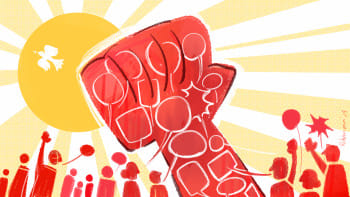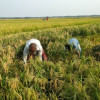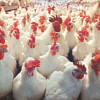WORLD FOOD DAY: Food security is not just about food production

World Food Day raises global awareness and prompts action for those suffering from hunger. Around this time, discussions often focus on the state of food security in Bangladesh. Food is not only a basic necessity but also a fundamental human right. Access to adequate, safe, and nutritious food forms the foundation for building a healthier society, promoting social justice, and ensuring a more prosperous future for the people of Bangladesh.
The right to food is mentioned in various international conventions, such as the Universal Declaration of Human Rights and the International Covenant on Economic, Social and Cultural Rights. It refers to the right to access adequate food or the means to achieve it, either through physical or economic access. This right is presented as the responsibility of states to take proactive steps toward eradicating hunger and malnutrition. Food security means having a reliable source of food or calories, but also access to nutritious and diversified foods in appropriate quantities for human health and development.
Food security, in Bangladesh, is an added right, as agriculture is one of the bases for both economy and culture. However, ensuring food security for all is still one of the challenging tasks the country faces. Despite improvement in various fields, such as agricultural production, millions of Bangladeshis are still faced with the grim realities of hunger, malnutrition, and food insecurity.
Bangladesh has made significant strides towards food production over the last five decades. According to the Food and Agriculture Organization, agricultural production in Bangladesh has been moving upward steeply owing to technological advances, coupled with better farming methodology and governmental initiatives. The country has almost attained self-sufficiency in rice—the staple for the general masses of Bangladesh. But food production alone can never guarantee food security.
The country is still beset with daunting challenges in accessing and affording nutritious food. According to the Global Hunger Index 2023, Bangladesh stands in 81st position amongst 125 countries, reflecting that the level of hunger remains serious. Malnutrition, especially in children, is still a common problem in the country. According to a UNICEF report, some 28 percent of children under five years of age suffer from stunting while 10 percent suffer from wasting; both conditions are indicative of chronic malnutrition, possibly with lifelong effects on physical and cognitive development.
Added to this are socioeconomic inequalities, climate change, and a lack of social safety nets. There may be food, but it has become unaffordable for many, and large sections of the population are living in poverty. It is the rural populations, women, and children who, above all else, bear this burden of food insecurity. This makes the right to food not just about availability but also about access and equity.
The right to food cannot be delinked from the broader socioeconomic disparities. The economic growth of Bangladesh over the past decade has been strong, but it hasn't trickled down equitably. The poorest sections of society still struggle with food inadequacy, driven by low wages, unemployment, and food price increases. It is even profound in rural settings where agriculture is the main economic activity and yet farmers often live on the margins because of fluctuating crop yields, lack of market access, and generally inadequate support from the government.
Another crucial factor in food security is gender disparity. Women, who tend to play crucial nurturing and food-providing roles for individual households, continue to experience several obstacles including low wages, limited access to land, and poor participation and representation in decision-making processes regarding food and agriculture. This inequity between genders impacts not only women's ability to feed themselves but even extends to the health and well-being of their children. Food security can be enhanced by empowering women through education and ensuring access to resources, and economic opportunities that place them on a level playing field with men.
Bangladesh is one of the most climate-vulnerable countries in the world. Rising sea levels, floods, cyclones, and changing weather patterns due to climate change have seriously impacted food production, especially in areas with salinity intrusion over agricultural land from the coast. Most farmers cannot adapt to these changes; therefore, the livelihoods of millions associated with agriculture are at risk.
Climate change strikes at the very root of vulnerabilities, exacerbating the struggles of those with little or no access to food. The government and development organisations have to take the lead in propagating climate-resilient agricultural practices, including the development of salt-tolerant crop varieties and sustainable water management systems. Ensuring that small-scale farmers, who are often on the front lines of climate impacts, have the resources and knowledge to adapt, is critical for safeguarding food security in the future.
The government has been taking various steps to enhance food security through different policies and programmes. The National Food Policy and the subsequent Country Investment Plan are examples of governmental initiatives to ensure access to food for all citizens. Social safety nets, such as the Vulnerable Group Development programme and the Public Food Distribution System, are designed to provide basic support to marginalised populations.
However, these programmes face several challenges amongst which targeting, efficiency, and resource allocation are worth mentioning. Most food distribution systems are prone to corruption and bureaucratic inefficiencies; hence population coverage is minimal. The government should, therefore, enhance such programmes, increase their transparency, and optimally manage the allocation of resources to realise this right to food for all.
Most importantly, agricultural production and diets have to be diversified. While rice may be a staple ingredient in our diet, it cannot meet all our nutritional requirements. Therefore, more cultivation and consumption of fruits, vegetables, pulses, and protein-rich foods like fish and poultry to reduce malnutrition is a must.
While national government action is paramount, complementing the advancement of the right to food in Bangladesh needs to be taken forward by civil society and international organisations. Food rights have to be at the heart of national development strategies if a better future is to be ensured in Bangladesh. This will not only mean an increase in food production but also addressing the root causes of food insecurity: poverty, inequality, and climate vulnerability. This means that the government engages in collaboration with civil society, the private sector, and international organisations in pursuit of food systems that are inclusive, sustainable, and resilient to such factors.
Empowerment of small-scale farmers, particularly women, in terms of access to resources, education, and technology, shall go a long way in improving the level of food security. In addition, it is necessary to enhance social safety nets, equal access to food, and diverse diets of nutritional value that will help in reducing malnutrition for a healthier society.
As we observe World Food Day, let us remember that the right to food is not just about addressing hunger in the short term but about building a future where everyone has the opportunity to live a dignified, healthy, and productive life. By prioritising the right to food, Bangladesh can pave the way for a more just, prosperous, and food-secure nation.
Dr Selim Raihan is professor at the Department of Economics in the University of Dhaka and executive director of South Asian Network on Economic Modeling (SANEM). He can be reached at [email protected].
Views expressed in this article are the author's own.
Follow The Daily Star Opinion on Facebook for the latest opinions, commentaries and analyses by experts and professionals. To contribute your article or letter to The Daily Star Opinion, see our guidelines for submission.

 For all latest news, follow The Daily Star's Google News channel.
For all latest news, follow The Daily Star's Google News channel. 










Comments